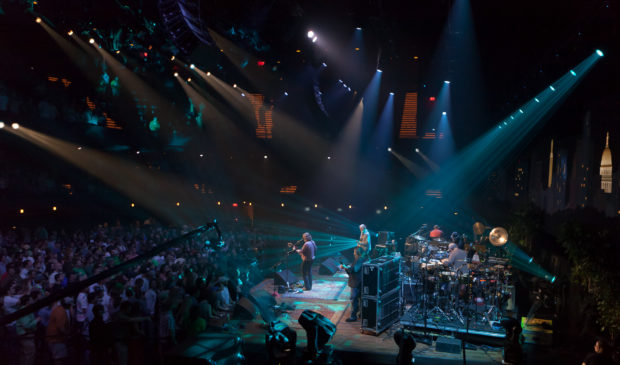About the Author
Chad Swiatecki is a 20-year journalist who relocated to Austin from his home state of Michigan in 2008. He most enjoys covering the intersection of arts, business and local/state politics. He has written for Rolling Stone, Spin, New York Daily News, Texas Monthly, Austin American-Statesman and many other regional and national outlets.
Newsletter Signup
The Austin Monitor thanks its sponsors. Become one.
Most Popular Stories
- Despite safety concerns, Council OKs new buildings above Shoal Creek
- Texas lawmakers finalize bill limiting property owners’ right to protest new homes nearby
- As Acacia Cliffs rezoning is approved, Critics say Council has sold out on its affordability commitments
- A multi-family rezoning at the rugged edge of Northwest Austin
- City eyes fund to preserve affordable housing, capitalize on overbuilt apartment market
-
Discover News By District
Popular Whispers
Sorry. No data so far.

HAAM eyes new partnerships, funding for long-term stability
Monday, November 26, 2018 by Chad Swiatecki
The Health Alliance for Austin Musicians is making a year-end push to raise the final $200,000 of its current operating budget, while at the same time fending off concerns from musicians about reduced financial assistance for health insurance plans in the federal marketplace.
Reenie Collins, the nonprofit’s executive director, told the Austin Monitor that, while HAAM has been buffeted by challenges this year, she expects to meet the fundraising goal and has identified more funding to add to the premium assistance program HAAM runs in partnership with Central Health.
Those near-term efforts come as Collins and other HAAM leaders are working to create more partnerships with local and regional health care organizations to stretch its $2.3 million operating budget even further.
HAAM, which has about 2,700 enrolled members who receive reduced-cost health care services, signed up 732 musicians to subsidize some premium costs for next year after open enrollment in the Affordable Care Act began this month. That’s down from the 1,147 who received assistance this year.
“Anytime you give something to someone and it gets taken away, they get very frustrated. That’s created a lot of panic, but there are still affordable programs out there,” Collins said. “When something is limited it creates a very competitive system and people start wondering, ‘How did you get that? Why are you better than me?’ We don’t want that, but it’s hard when you have limited resources.”
In 2017, HAAM leaders said increasing enrollment and health care costs could force it to stop taking new members.
Collins hopes to announce additional premium assistance soon – ACA open enrollment closes in mid-December – and said HAAM has been in talks with the nonprofit accelerators Notley Ventures and Mission Capital about exploring options for restructuring or creating ongoing revenue streams to ensure more stability in the next five years.
She’s also having ongoing discussions with city leaders about becoming involved in future public/private partnerships with developers, although there’s no expectation of receiving direct funding from the city.
Currently most of HAAM’s funding comes from large annual events like HAAM Day, which this year raised $560,000, and donations from individuals and groups such as All ATX.
“Another goal is to stay very close to people doing big things on a citywide basis,” she said. “There could be some developments that come in where, if HAAM was a part of that there could be some tax abatements, but that’s all bigger than me. The chance of us getting city money is pretty slim. We need money to grow significantly over the next few years but what that looks like, I’m not sure.”
Asked about the role of the University of Texas’ Dell Medical School in helping provide care for local musicians, Collins said the school would make sense as a partner along with providers such as Central Health, Seton Healthcare Family and St. David’s HealthCare, but that creating those agreements could take time because the school is so new.
In the meantime, she said HAAM will continue looking for new care arrangements with Seton and existing partners – which annually provide around $16 million of in-kind services to local musicians – and pushing local politicos and other leaders to find new ways to care for Austin’s creative class.
“At the end of the day, the leaders of this community have to decide how valuable are musicians to our community,” she said. “How much do we want to keep them here, and how much do we want to help them? There’s a lot of folks helping musicians in a lot of different ways, and there’s limited funding for all the nonprofits doing great things. If you’re sick or you’re dead, you can’t play. That’s how integral we are.”
Photo by Earl McGehee made available through a Creative Commons license.
The Austin Monitor’s work is made possible by donations from the community. Though our reporting covers donors from time to time, we are careful to keep business and editorial efforts separate while maintaining transparency. A complete list of donors is available here, and our code of ethics is explained here.
You're a community leader
And we’re honored you look to us for serious, in-depth news. You know a strong community needs local and dedicated watchdog reporting. We’re here for you and that won’t change. Now will you take the powerful next step and support our nonprofit news organization?



